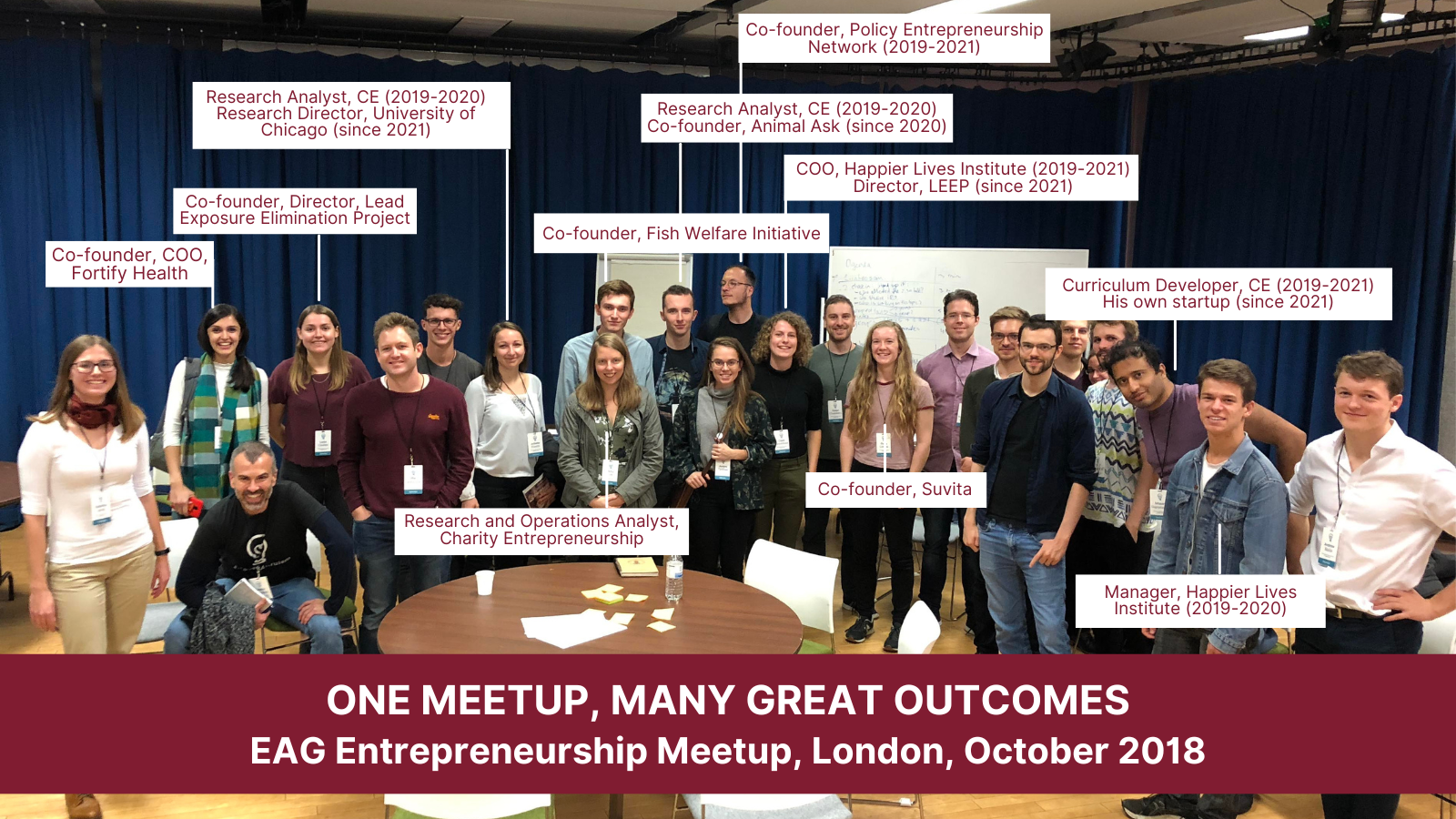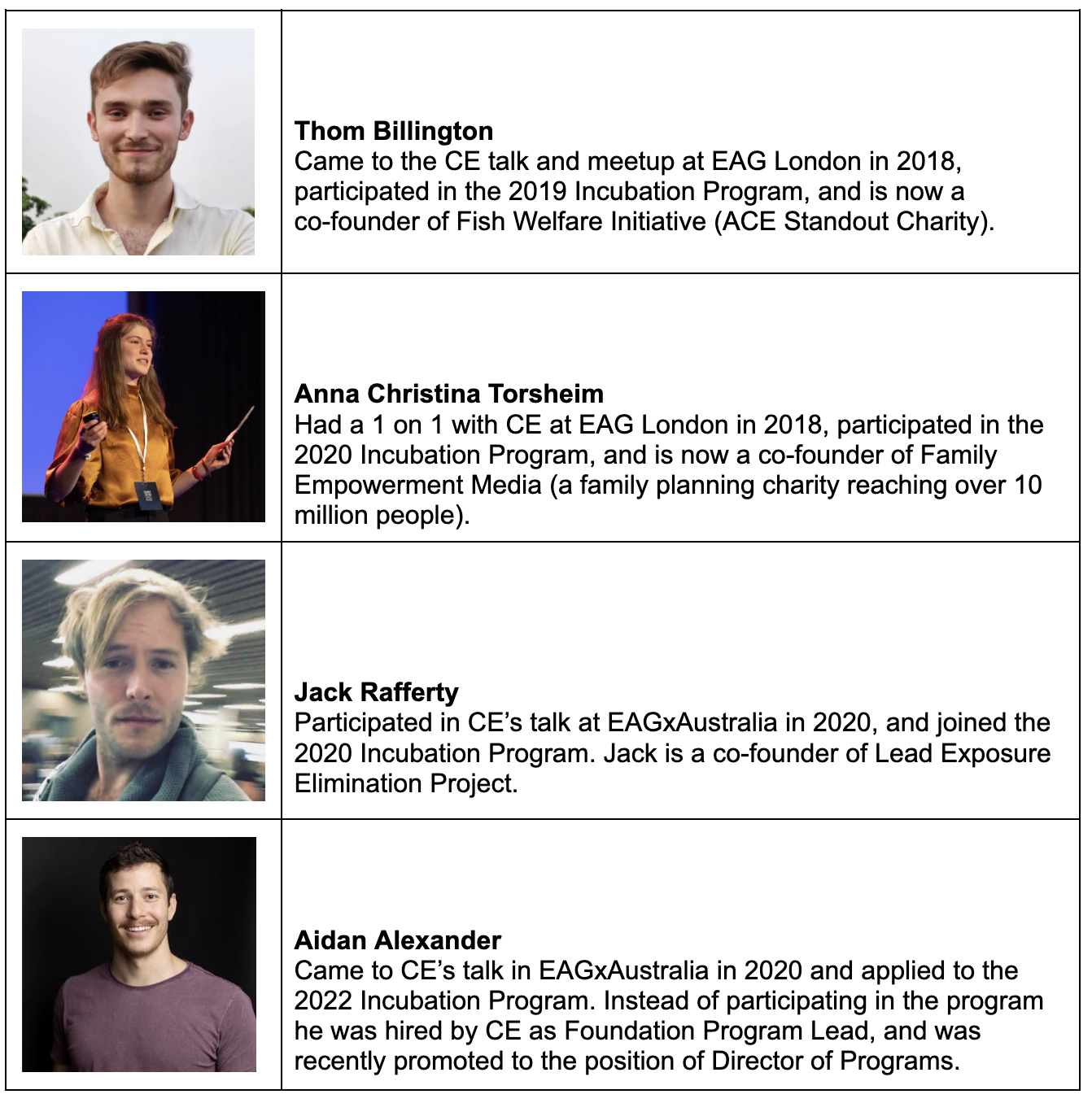For individuals in the EA community, EA Global and EAGx conferences are an opportunity to be exposed to ideas and people who can help us identify and pursue more impactful paths. And for organizations, they’re an opportunity to connect with potential new hires, grantees, and funders.
Charity Entrepreneurship recently shared with us (the CEA events team) a summary of the impact their participation at EAG and EAGx has had on their Incubation Program.
We were inspired by this post, and wanted to encourage orgs working on EA causes — object and meta, large and small, older and newer — to consider carefully how to get the most out of the conferences we’ve got lined up in 2023. The opportunities include:
- Talks & workshops can be used to inform the community about your work and how others can contribute to increasing your impact as collaborators, funders or recruits.
- Office hours & career fairs are available for you to interact directly with those interested in your plans and how they might fit into them.
- 1-on-1 meetings are the bedrock of all the conferences CEA is involved in organizing, facilitating in-depth discussion and establishing connections between people with common goals.
If you’re interested in your org appearing on the program at an upcoming conference, or would like to discuss with us how best to approach these events, please reach out to us at hello@eaglobal.org.
We thought sharing Charity Entrepreneurship’s experience publicly might be valuable for others to learn from in planning their own approach to future conferences. Here’s their story in their own words.
CE’s EAG and EAGx Success Stories

From the launch of Charity Entrepreneurship’s Incubation Program, EAG and EAGx conferences have been a crucial part of the organization’s outreach strategy. Thanks in part to CE’s increasing presence — talks, workshops, and participation in numerous career fairs — nonprofit entrepreneurship has become a recognized career option in the effective altruist community.
From just one round of applications for CE’s Incubation Program, 325 out of 720 applicants had participated in EAG or EAGx conferences where the organization was present. 169 applicants had interacted directly with CE at EAGs by participating in a workshop, office hours, or talking to CE staff one on one.
When young entrepreneurs who got into the Incubation Program and started new high-impact charities were asked what convinced them to apply, they named EAGs as one of the top reasons (along with the EA movement in general, partner/friend, internships, talking to CE staff members and group organizers).
So far, Charity Entrepreneurship has started 23 organizations and provided them with $1.88 million in total funding. These organizations have fundraised a further $20 million to cover their costs and are now reaching over 120 million animals and over 10 million people with their interventions. You can learn more about them on CE’s website; they include charities like Fortify Health (three GiveWell Incubation Grants, 25% chance of becoming a top charity), Fish Welfare Initiative (ACE Standout Charity), Shrimp Welfare Project (first organization ever working on shrimp welfare), and Lead Exposure Elimination Project (precursory policy organization now working in 10 countries).
Key benefits for CE
- Finding talented entrepreneurs to start high-impact projects (50% of the founders had been in contact with CE’s outreach efforts during EAG conferences).
- Finding hires for the CE team (20% of the team have been hired thanks to outreach efforts during EAG conferences), as well as fellows and interns.
- Making useful connections for funding (10% of funding potentially coming from connections made during EAG conferences).
- Sharing top ideas for most impactful interventions in various cause areas (Global Health & Development, Biorisk, Animal Welfare, EA Meta) with the broader EA community.
The most successful events in terms of number of applications were:
- EAGxBerlin: 71
- EAG London: 47
- EAG Washington: 44
- EAGxPrague: 37
- EAGxRotterdam: 32
- EAGxOxford: 33
- EAGxSingapore: 24
- EAGxBoston: 21
Specific examples of success stories:

From CEA: How can other organizations learn from CE’s approach?
We think CE are particularly good at making use of EAG(x) and that they might be especially well-positioned to get benefits out of our events. But they aren’t the only organization that manages to get a lot out of events, and we think that some parts of their approach might generalize. Some strategies that might generalize to other organizations:
Plan ahead
Know what your goals are for the conference and identify attendees to speak with in advance. We think CE has been particularly successful because they have a strong sense of what they are trying to achieve and how to achieve it. You could consider setting SMART goals (specific, measurable, assignable, realistic, and time-related). Make sure your goals are tracking the things you want to achieve and that it is clear whether you’ve achieved them or not.
For example: If you’re looking to find a potential research collaborator for an upcoming paper on factory farming and pandemics risks, you might set a goal to read profiles of each person who lists “animal welfare” AND “biosecurity” in their swapcard profile. You might make a second goal from there. Say 30 people list both, but 10 people seem reasonably well-suited to actually work on the paper. You could make a new goal: Reach out to the 10 people who seem like plausible collaborators and try to set meetings with them.
Consider back-planning
Back-planning (or backchaining) starts planning from the end and works backwards. I often recommend this tool for project management and realistic time estimates, but I think it can be helpful for clarifying the steps in order to make sure you actually do the thing.
For example, maybe the task you want to complete is to hire a new ops associate at EAG. Imagine you’re at the end of your task; “Offering a role to an attendee”. Now move backwards, step-by-step. What is the step right before you finish? Maybe you have to meet with them to actually hire them so there would have to be leads.” So, you repeat Step 3 until you get to where you are now. Is that all? Well, for people to want the job I’d have to publicize the role and share it with attendees, and I’d have to reach out to promising candidates. How would I know if people are promising? I guess I’d need a list of attendees who want to work in ops. Oh, I can get that from swapcard!” (Don’t forget to use the spreadsheet view!). Write down how long you think the task will now take you. “Huh, thinking it through like this, I’d need something like 2 weeks before EAG to coordinate leads and have enough staff to have meetings onsite. And I’d need another week for writing my job ad. And another week for unforeseen issues” You now have a detailed plan!
Work with the organizers
Consider hosting a talk, workshop, career fair stall, meetup, or office hours and use your content slot to attract potential hires, funders, or collaborators. You can submit nominations for content here (feel free to nominate yourself / your organization) or by emailing hello@eaglobal.org (EAGx organizer emails can be found on the event pages). Please do this as far in advance as possible (ideally at least 6 weeks)! If you end up with a content slot, make sure to clarify your goals (as described above) and share them with the organizers. We love to help!
Reflect and iterate
Review on how the event went for you (perhaps by writing it up and sharing with the EAG team!), improve your approach for future conferences, and give us feedback about how we can better support you next time!

This is the first I’ve heard of swapcard’s spreadsheet mode, that sounds potentially very useful!
I couldn’t easily find info about it, do you have a link?
Thanks!
You need to be an attendee of the conference and then you can access it from within Swapcard.